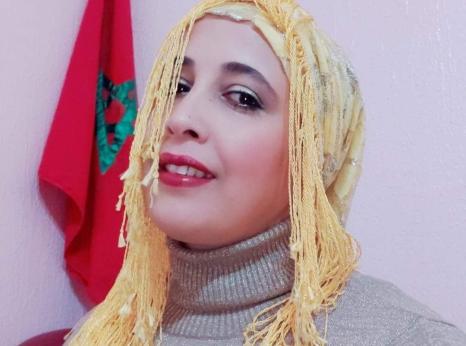Morocco and Western Sahara: Release Blogger Jailed For Offending Islam

Fatima Karim is 39 years old and owns two sewing and cosmetics companies in Oued Zem, a city in central Morocco, about 150km from Casablanca. In July 2021, she declared to have been targeted by death threats for her pro-Israel position. She ran in the 2015 regional elections as part of the progressive and socialist party (PPS).
Police arrested Fatima Karim on 26 July 2022, following an interrogation on her social media posts. Police took her to Khouribga prison, around 40km from her home in Oued Zem, where she remains in solitary confinement. A family member told Amnesty International that they believe she is forbidden from speaking to other inmates for fear that she will influence their ideas. She is permitted family visits every 15 days, but her parents cannot afford to visit more than once per month.
Article 267-5 of the Moroccan Penal Code punishes a person convicted of "causing harm" to Islam with a prison sentence of 6 months to 2 years and a fine of 20,000 to 200,000MAD. In June 2021, a Moroccan court sentenced a Morocco-Italian woman to three and a half years for posts about the Qu'ran on Facebook which were deemed insulting to Islam. In July 2020, a court in Safi, a city in Western Morocco, used Article 267(5) to sentence Muhammed Awatif Qashqash to 6 months in prison and a fine of 300 Moroccan Dirhams (around 32 USD) for a caricature he posted online depicting several religious figures, including the Prophet Mohamed. In May 2020, the Casablanca police arrested and charged Moroccan actor Rafik Boubker under Article 267(5) for a video posted on Facebook in which he spoke about doing abolitions with whisky and vodka and said that alcohol was a good way of connecting with God. He was released the following day after paying a fine.
The right to freedom of expression, as stated in Article 19 of the International Covenant on Civil and Political Rights (ICCPR), includes the right to impart information through any media and regardless of frontiers. The U.N. Human Rights Committee, the authoritative interpreter of the ICCPR, in its 2011 General Comment on the ICCPR’s article 19, held that the right to freedom of expression protects speech that might be deemed offensive or hurtful to followers of a particular religion, unless the speech in question amounts to “advocacy of national, racial or religious hatred that constitutes incitement to discrimination, hostility or violence.”
The right to freedom of religion is enshrined in Article 18 of the ICCPR and includes the Freedom to adopt, change or renounce a religious belief. The Human Rights Committee general comment 22 sets out in paragraph 5 that freedom of religion "necessarily entails the freedom to choose a religion or belief, including the right to replace one's current religion or belief with another or to adopt atheistic views". Paragraph 9 of the same comment states that "the fact that a religion is recognized as a State religion or that it is established as official or traditional or that its followers comprise the majority of the population, shall not result in any impairment of the enjoyment of any of the rights under the Covenant, including articles 18 and 27, nor in any discrimination against adherents to other religions or non-believers".
The Moroccan constitution protects freedom of expression in Chapter 25, which states that freedom of thought and expression is guaranteed in all its forms. However, in the court document from the First Instance court in Oued Zem on Fatima Karim's trial, the court rejected the argument that the prosecution violates her freedom of expression as constitutionally guaranteed, arguing that the exercise of this right should be consistent with other values enshrined in the Constitution, including its preamble, which states that the Moroccan identity is characterized by the assumption of Islam, and that Morocco is a nation based on the Islamic religion.”